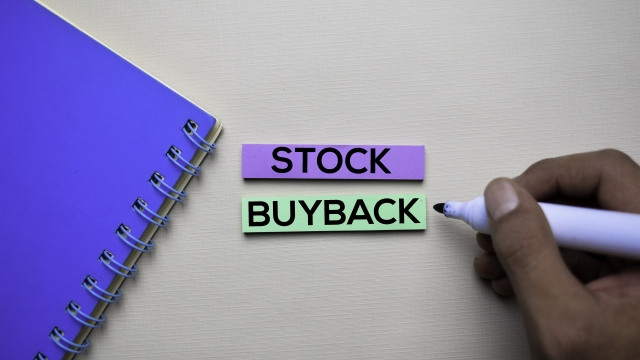/stock-buyback-text-on-sticky-notes-with-office-desk--stock-market-exchange-concept-1158906702-6d8c1100226b48198ba3cf8b1a9c9384.jpg)
In today’s fast-paced corporate landscape, one particular financial strategy has been garnering increased attention and heated debate: corporate buybacks. As businesses seek efficient ways to manage their balance sheets and allocate capital, the practice of repurchasing company shares has emerged as a favored tool. While some argue that corporate buybacks empower investors and drive economic growth, others raise concerns about the potential for increased inequality and the wider impact on society.
Corporate buybacks, also known as share repurchases, involve a company buying its own shares from the open market or its existing shareholders. This can be seen as a way for corporations to invest in themselves, signaling confidence in their future prospects. By reducing the number of outstanding shares, buybacks can boost stock prices and potentially increase shareholder value. Proponents argue that this strategy allows for a more efficient use of capital, better returns for investors, and can even stimulate the overall economy by encouraging investment in new ventures.
However, critics caution that corporate buybacks may exacerbate inequality and stifle long-term investment. Instead of using their profits to invest in research and development, hiring new employees, or increasing wages, some argue that companies are prioritizing short-term gains for shareholders. This can lead to a concentration of wealth among top executives and existing shareholders, leaving employees and other stakeholders with less benefit.
In this complex landscape, the role of corporate IT asset disposal becomes increasingly relevant. Companies are constantly upgrading their technology and are faced with the challenge of disposing of their outdated IT assets responsibly. This is where programs like SellUp’s Corporate Buyback initiative come into play, providing businesses with an efficient, profitable, and environmentally responsible solution for managing their IT asset disposal. Such programs aim to strike a balance between financial efficiency and sustainability, offering a means for companies to generate value while minimizing their environmental footprint.
As the debate surrounding corporate buybacks continues, it is crucial to assess both the potential benefits and drawbacks. Only through a nuanced understanding of the complexities involved can we seek a path forward that enables businesses to make informed decisions, supports investors, and works towards a more equitable future.
Examining the Impact of Corporate Buybacks
Corporate buybacks have become a prominent strategy for companies looking to effectively manage their finances and maximize shareholder value. By repurchasing their own shares in the open market, companies aim to boost their stock prices and signal confidence in their future prospects. However, the impact of corporate buybacks is a controversial subject, with supporters highlighting the benefits for investors and critics raising concerns about potential inequalities.
Proponents of corporate buybacks argue that they provide a means of returning value to shareholders. When a company repurchases its own shares, the remaining outstanding shares represent a larger ownership stake in the company. This can lead to increased earnings per share and potentially drive up the stock price, benefiting shareholders. In this sense, corporate buybacks can be seen as a way to empower investors by unlocking the value of their investment.
On the other hand, skeptics of corporate buybacks contend that these practices can exacerbate income inequality. When companies allocate a substantial portion of their profits towards buybacks, there may be less capital available for other purposes, such as investing in long-term growth, research and development, or employee compensation. This has led to concerns that corporate buybacks prioritize short-term gains for shareholders over the overall welfare of the company and its stakeholders.
One area where corporate buybacks have gained traction is in the realm of IT asset disposal. Companies often face the challenge of disposing of their old IT assets responsibly, to both ensure data security and minimize environmental impact. In this context, programs like "SellUp’s" Corporate Buyback program have emerged as a solution. Such programs offer companies an efficient, profitable, and environmentally responsible means of disposing of their old IT assets, aligning the objectives of corporate buybacks with sustainability practices.
In conclusion, the impact of corporate buybacks is a complex issue with various perspectives. While they can empower investors by driving up stock prices, there are concerns about potential inequalities and the allocation of resources. Nonetheless, in specific contexts such as IT asset disposal, corporate buyback programs can offer companies a responsible and lucrative solution. Understanding the implications of corporate buybacks requires careful consideration of their benefits and potential drawbacks.
The Role of SellUp’s Corporate Buyback Program
SellUp’s Corporate Buyback program plays a vital role in bridging the gap between businesses seeking to dispose of their outdated IT assets and the potential for maximizing profits while ensuring environmental responsibility. With their efficient and profitable solution, SellUp empowers companies to make the most of their old IT assets, rather than simply discarding them.
Through SellUp’s Corporate Buyback program, businesses now have a lucrative alternative to traditional disposal methods. By selling their old IT assets, companies can recoup a significant portion of their initial investment, which can then be reinvested in newer technologies or other priority areas of their operations. This not only boosts financial health but also promotes a circular economy where resources are maximized and waste is minimized.
Moreover, SellUp’s program enables businesses to address sustainability concerns by offering an environmentally responsible solution for disposing of old IT assets. By facilitating the refurbishment and resale of these assets, SellUp reduces electronic waste and lessens the burden on landfills. This aligns with the growing trend of corporate social responsibility, appealing to businesses looking to minimize their environmental impact and enhance their reputation among both investors and consumers.
In summary, SellUp’s Corporate Buyback program plays a pivotal role by providing businesses with an efficient, profitable, and environmentally responsible solution for disposing of their old IT assets. By leveraging this program, companies can not only recoup their investments but also contribute to a more sustainable and circular economy.
Addressing Concerns about Inequality and Environmental Sustainability
As the debate around corporate buybacks continues, concerns have been raised regarding their impact on inequality and environmental sustainability. Critics argue that these practices exacerbate wealth disparities and contribute to environmental degradation. However, companies like SellUp aim to address these concerns through their corporate buyback program.
SellUp’s corporate buyback program offers an efficient, profitable, and environmentally responsible solution for businesses seeking to dispose of their old IT assets. By providing a platform for companies to sell their outdated technology, SellUp ensures that these assets are not wasted or discarded, reducing the environmental footprint associated with e-waste. This proactive approach allows businesses to embrace sustainability while also finding value in their obsolete IT equipment.
Furthermore, SellUp’s corporate buyback program empowers investors by facilitating a more equitable distribution of wealth. Through the sale of their IT assets, companies can generate additional funds that can be reinvested or redistributed within their organization. This provides an opportunity for smaller investors and stakeholders to benefit from the financial gains associated with corporate buybacks. By broadening the scope of wealth distribution, SellUp’s program contributes to a more inclusive and balanced economic landscape.
In conclusion, SellUp’s corporate buyback program addresses concerns regarding inequality and environmental sustainability by offering a sustainable solution for businesses to dispose of their old IT assets. By promoting responsible asset disposal and facilitating wealth distribution, SellUp empowers investors while contributing to the reduction of environmental harm. It is through initiatives like these that the corporate buyback game can be transformed into a force for positive change.




